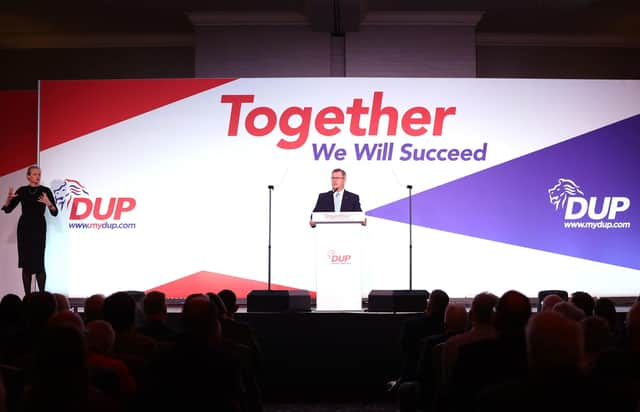Owen Polley: DUP delivers a strongly devolutionist message when devolution’s short-comings have rarely been more obvious


After the 2017 general election, when the party brokered a confidence and supply arrangement to support Theresa May’s Conservative government, it relished its role as ‘kingmaker’. It hardly seemed likely then that the next few years would be so turbulent for the DUP.
Everything changed when Mrs May’s successor, Boris Johnson, immediately broke his promise never to create a border in the Irish Sea and signed the Northern Ireland Protocol in late 2019.
Advertisement
Hide AdAdvertisement
Hide AdAlthough the DUP opposed this Brexit deal, it had already agreed to a regulatory frontier, which made the negotiation possible. Voters expressed their dissatisfaction with that misjudgment in the December general election, when the party lost two seats and 5% of its vote.
The DUP subsequently endorsed the New Decade, New Approach agreement in early 2020, which handed Sinn Fein generous concessions in order to induce republicans back to Stormont. In addition, the party continued to respond limply to the protocol, with the eventual result that Foster was ousted as leader in 2021. Her successor, Edwin Poots, resigned after only 21 chaotic days.
Under Sir Jeffrey Donaldson, this period of instability largely ended and the DUP’s faltering opinion poll scores began to recover. He stated that his priority was to fight the protocol. And his decision, in February 2022, to collapse the executive in protest at the Irish Sea border was popular among grassroots unionists.
The party’s performance at the 2022 assembly election was poor, but not as dismal as it could have been, and the voters the DUP lost drifted mainly to the fiercely anti-protocol TUV. By the time the 2023 local government elections were held, unionists were more confident that the party was firm in its opposition to the sea border. Sir Jeffrey recovered a little support previously lost to Jim Allister.
Advertisement
Hide AdAdvertisement
Hide AdAt that election, the political landscape had shifted again, thanks to Rishi Sunak’s Windsor Framework agreement. That deal appeared at first to improve the protocol, but the promises it offered fell apart, and it soon became apparent that it would mean a harder Irish Sea border than was implemented previously.
The problem for Sir Jeffrey now is that the government looks committed fully to this dispensation, regardless of its flaws. Increasingly, it seems like he has a choice between returning to Stormont, which resembles capitulation, or maintaining a boycott that appears ever more futile.
At times, unionists can seem intransigent and unreasonable, which is off-putting to potential sympathisers on the mainland. To Sir Jeffrey’s credit, he’s taken care to avoid giving that impression, stressing consistently that he wants to find a solution to the framework and return to Stormont.
It’s difficult to seem perpetually optimistic, though, without raising unrealistic expectations or appearing to falter on important points of principle. In his pre-conference interviews, Sir Jeffrey said that progress had been made in negotiations with the government but that there were still ‘gaps’ to close.
Advertisement
Hide AdAdvertisement
Hide AdHe claimed that the government could satisfy his party’s demands by bringing, “forward the legislation that is needed and (introducing) the additional measures required to safeguard our ability to trade with the rest of the UK”.
From the outside, it’s hard to envisage how legal guarantees from Sunak and his administration, which will surely be defeated in next year’s election, could amount to more than soothing words for unionists, never mind meet the DUP’s ‘seven tests’. In a recent column in the News Letter (September 30), Sir Jeffrey cited the ‘democratic deficit’ as one of the key problems with the Windsor Framework. That implied that he thinks that Brussels’ authority over Northern Ireland is less of a problem than the fact that we do not have a say in EU decision-making.
In his leader’s speech on Saturday, as in many of his recent statements, Sir Jeffrey spoke about restoring ‘economic rights’ under the Act of Union, which is a vaguer formulation than the DUP’s already ambiguous ‘seven tests’.
“This party has a proven track record of saying yes, and leading from the front, when it is right to do so,” Sir Jeffrey said, “Equally we will not be afraid to say no if we conclude that what is on offer does not adequately deal with our fundamental concerns.”
Advertisement
Hide AdAdvertisement
Hide AdHe cited the St Andrews Agreement, a deal that eventually delivered the prospect of a Sinn Fein minister, as one of his party’s successes. Then championed the potential for devolution to “build a better future for Northern Ireland by fixing our health service,” a project that might involve closing services in some hospitals. Which of the assembly parties are prepared to contemplate hard truths like that, rather than to resort to easy populism?
Sir Jeffrey believes that “having local institutions that succeed in delivering for everyone in Northern Ireland is an essential element in building our case," for the Union. This was a strongly devolutionist message, at a time when devolution’s short-comings have rarely been more obvious.
It is one thing to argue that power-sharing must be restored, and the DUP is free to join its rival, the UUP, in making that case, It would be another to claim, on the basis of whatever ‘progress’ has apparently been made in negotiations with the government, that Northern Ireland’s place in the Union has been fully restored.
Short of some exceptional development, voters will not believe that.